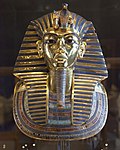Funerary art is any work of art forming, or placed in, a repository for the remains of the dead. The term encompasses a wide variety of forms, including...
93 KB (12,130 words) - 16:27, 30 October 2024
The funerary art of ancient Rome changed throughout the course of the Roman Republic and the Empire and took many different forms. There were two main...
65 KB (8,500 words) - 00:27, 11 September 2024
Funerary art in Puritan New England encompasses graveyard headstones carved between c. 1640 and the late 18th century by the Puritans, founders of the...
31 KB (4,192 words) - 23:50, 3 November 2024
and their art. Etruscan art is usually divided into a number of periods: 900 to 700 BC – Villanovan period. Already the emphasis on funerary art is evident...
34 KB (3,899 words) - 05:59, 26 October 2024
Ancient Egyptian funerary practices of the wealthy included the per nefer, house of beauty Memorial Memorial bench Commemorative plaque Funerary art...
2 KB (173 words) - 13:45, 23 May 2024
Roman funerary practices include the Ancient Romans' religious rituals concerning funerals, cremations, and burials. They were part of time-hallowed tradition...
133 KB (19,105 words) - 20:07, 25 October 2024
judge the deceased, but simply to guide them. Appearing frequently on funerary art, psychopomps have been depicted at different times and in different cultures...
9 KB (939 words) - 21:01, 3 November 2024
Art Museum (Baltimore, US) 1st–2nd century AD; bronze or copper alloy; 20.6 × 14 cm; Metropolitan Museum of Art The earliest purpose-built funerary containers...
154 KB (18,285 words) - 03:56, 2 November 2024
Memento mori (category Christian art about death)
philosophers of classical antiquity and Christianity, and appeared in funerary art and architecture from the medieval period onwards. The most common motif...
39 KB (3,804 words) - 22:14, 3 November 2024
chthonic figure in Etruscan mythology shown in a variety of forms of funerary art, such as in tomb paintings and on sarcophagi. Vanth is a female demon...
6 KB (836 words) - 16:51, 1 November 2024
Grave goods (redirect from Funerary objects)
social status played a role in what was left and how often it was left. Funerary art is a broad term but generally means artworks made specifically to decorate...
18 KB (1,994 words) - 07:04, 10 September 2024
Erotic art in Pompeii and Herculaneum has been both exhibited as art and censored as pornography. The Roman cities of Pompeii and Herculaneum around the...
34 KB (3,790 words) - 18:35, 2 November 2024
Terracotta Army (category Funerary art)
armies of Qin Shi Huang, the first emperor of China. It is a form of funerary art buried with the emperor in 210–209 BCE with the purpose of protecting...
83 KB (8,307 words) - 14:47, 16 October 2024
protection between rituals. Ancient grave markers typically incorporated funerary art, especially details in stone relief. With greater literacy, more markers...
34 KB (3,804 words) - 21:53, 30 October 2024
Yangjiawan terracotta army (category Funerary art)
The Yangjiawan terracotta army (Ch: 杨家湾兵马俑) is a small funeral terracotta army of the Western Han period, which was excavated in Yangjiawan, in the region...
5 KB (569 words) - 03:06, 6 November 2024
Angel of Grief (category Funerary art)
as a means of memorializing the woman. Unlike the typical angelic grave art, "this dramatic life-size winged figure speaks more of the pain of those...
8 KB (728 words) - 04:03, 4 October 2024
monuments first appeared in the 1380s and remained a popular form of funerary art for 200 subsequent years. In a still widely debated theory popularized...
15 KB (1,885 words) - 20:37, 27 October 2024
Sarcophagus of the Spouses (category Funerary art)
periods. The Etruscans were well known for their terracotta sculptures and funerary art, predominantly sarcophagi and urns. This sarcophagus is a late sixth-century...
15 KB (1,821 words) - 22:12, 25 October 2024
Tomb effigy (category Funerary art)
wrapped in a shroud, and shown either dying or shortly after death. Such funerary and commemorative reliefs were first developed in Ancient Egyptian and...
54 KB (6,699 words) - 23:30, 27 October 2024
should normally be considered as genderless. In 19th-century art, especially funerary art, this traditional convention is sometimes abandoned. The lack...
38 KB (4,327 words) - 15:01, 7 November 2024
Incomplete History of the Art of the Funerary Violin is a 2006 book by Rohan Kriwaczek, purportedly tracing the lost history of funerary violin. Contrary to...
5 KB (486 words) - 21:11, 6 October 2024
Anubis (section Portrayal in art)
Anpu in Ancient Egyptian (Coptic: ⲁⲛⲟⲩⲡ, romanized: Anoup), is the god of funerary rites, protector of graves, and guide to the underworld, in ancient Egyptian...
33 KB (3,545 words) - 10:46, 29 October 2024
Roman sculpture (redirect from Figures in roman art)
Roman funerary art also offers a variety of scenes from everyday life, such as game-playing, hunting, and military endeavors. Early Christian art quickly...
36 KB (4,010 words) - 22:03, 28 December 2023
A funerary cult is a body of religious teaching and practice centered on the veneration of the dead, in which the living are thought to be able to confer...
6 KB (832 words) - 14:56, 14 March 2023
Ankh (section Use in religion and art)
its religion, features the ankh prominently. It appears in temples and funerary art in many of the same contexts as in Egypt, and it is also one of the most...
24 KB (3,130 words) - 04:07, 6 November 2024
Brompton Cemetery (section Funerary art)
avenue, from North Lodge Brompton Cemetery Magnificent Seven cemeteries Funerary art London Cemetery and Extension Victorian cemetery Commonwealth War Graves...
44 KB (4,536 words) - 13:41, 27 October 2024
handshakes also appear in Archaic Greek, Etruscan and Roman funerary and non-funerary art. Muslim scholars have written that the custom of handshaking...
29 KB (2,910 words) - 07:26, 26 September 2024
Ushabti (category Funerary art)
shawabti, with a number of variant spellings) was a funerary figurine used in ancient Egyptian funerary practices. The Egyptological term is derived from...
13 KB (1,527 words) - 20:11, 16 October 2024
Immortelle (cemetery) (category Funerary art)
An immortelle is a long-lasting flower arrangement placed on graves in cemeteries. They were originally made from natural dried flowers (which lasted longer...
3 KB (395 words) - 21:49, 14 February 2022




























